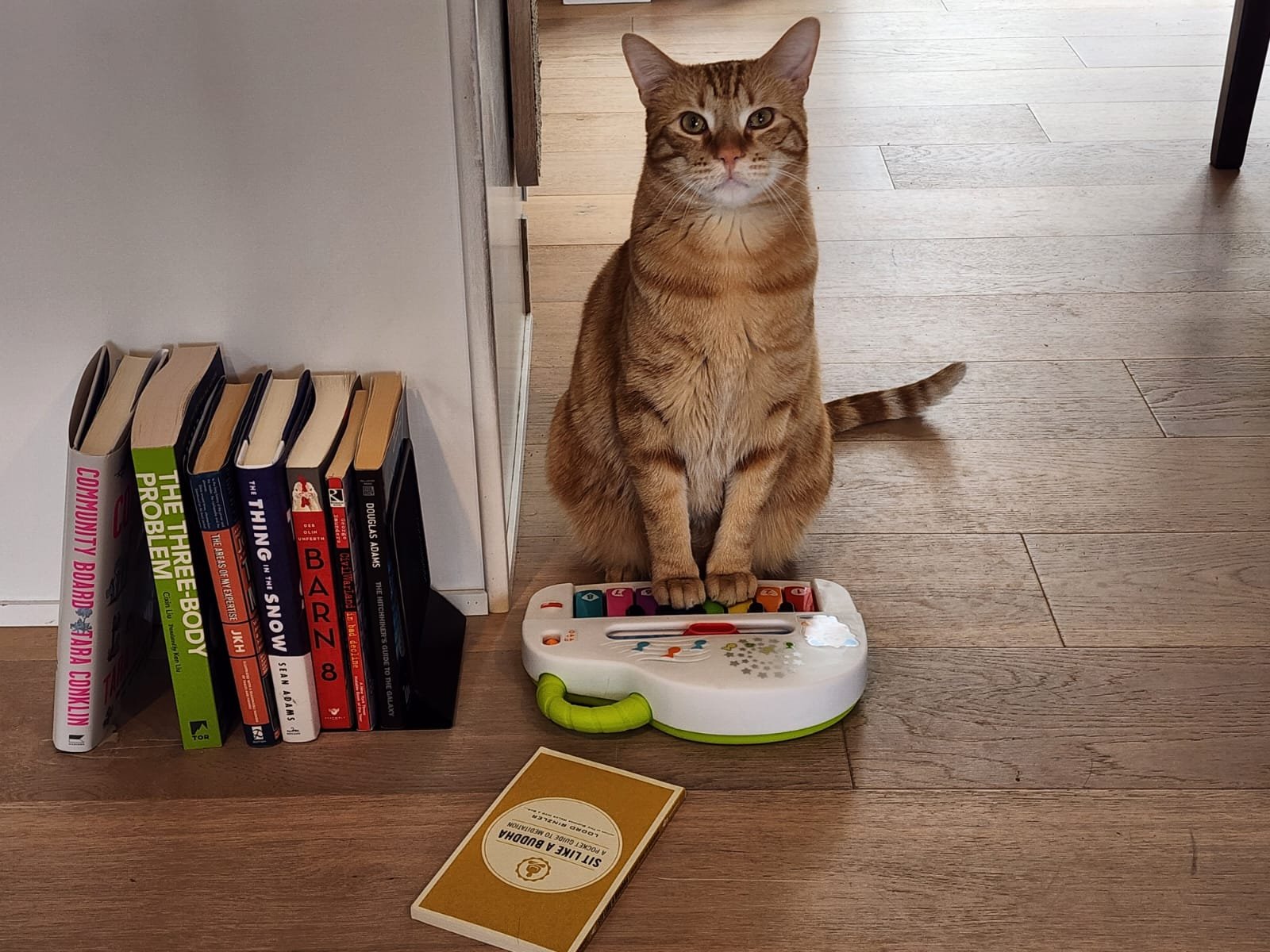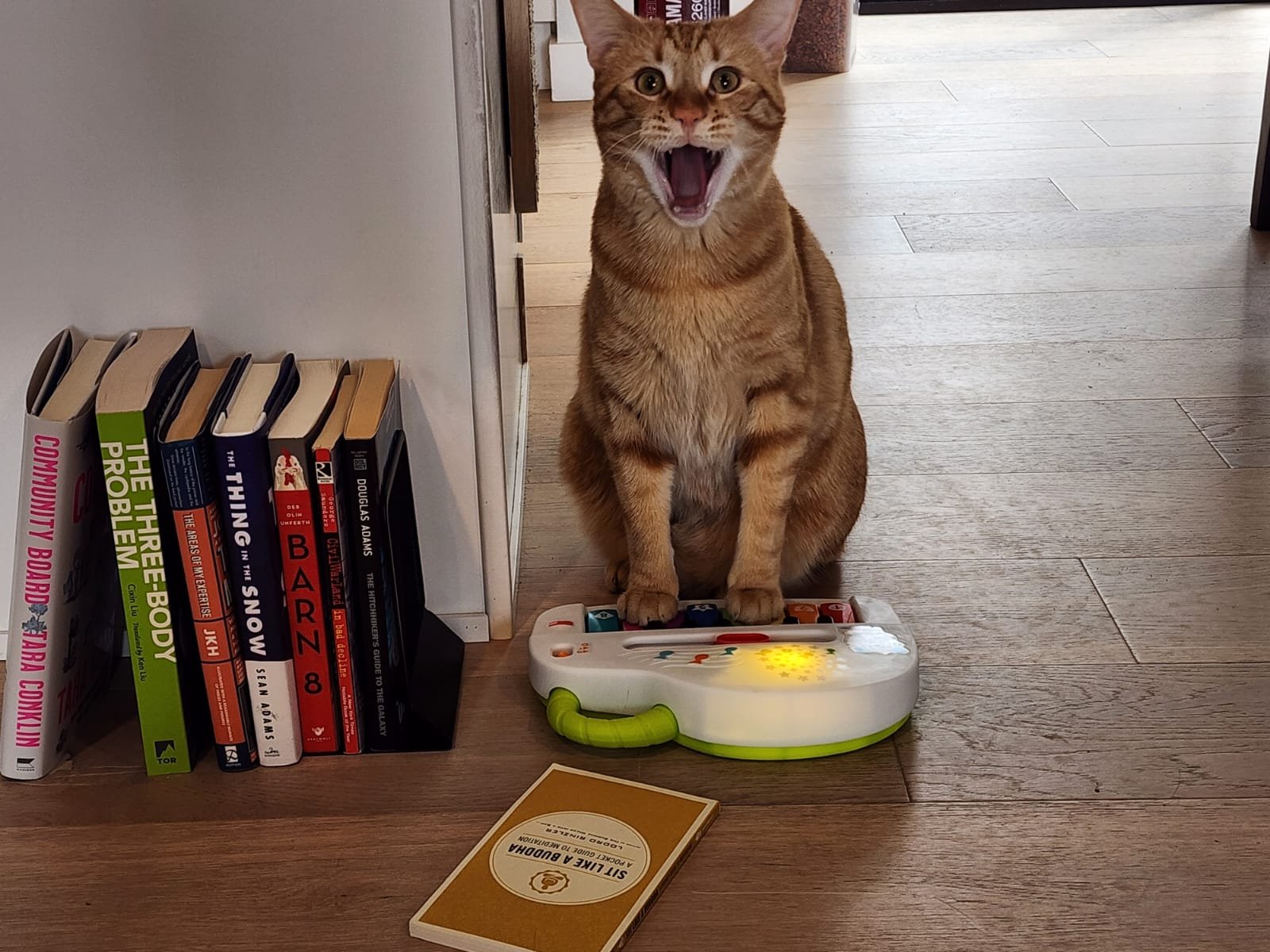Sea of Tranquility v. Babel
The 2023 Tournament of Books, presented by Field Notes, is an annual battle royale among the best novels of the previous year.
MARCH 15 • OPENING ROUND
Sea of Tranquility
v. Babel
Judged by Nicola Twilley
Nicola Twilley (she/her) is co-author of Until Proven Safe: The History and Future of Quarantine, named a best book of 2021 by Time, NPR, the Financial Times, and the Guardian, as well as co-host of the award-winning podcast Gastropod, which looks at food through the lens of science and history. She is a frequent contributor to the New Yorker. Known connections to this year’s contenders: None. / @nicolatwilley
First, a disclaimer: I’ve only ever been invited to judge anything once before in my life. It was a competition to decide which beer should be the official drink of Ben Franklin’s 300th birthday, which tells you everything you need to know about my qualifications and expertise.
Also, I should confess that, as a reader, I am unreasonably biased against sci-fi and fantasy. Even when it’s skillfully done, I tend to resent the amount of explanation required to make sense of an alternative reality: If I wanted to explicitly learn stuff, I’d be reading nonfiction. In other words, neither of the novels in this match-up was really “my type” of book. To add to that preexisting bad attitude, the first two episodes—all I could bring myself to watch—of the HBO adaptation of Emily St. John Mandel’s Station Eleven were so irritating that I’d decided I never wanted to read anything by her again. (If the painfully earnest members of the Traveling Symphony are only the kind of people who survive a pandemic, I would prefer not to.) This makes no sense, because I actually enjoyed Station Eleven in book form, and the TV series doesn’t even follow the source material, but these kinds of prejudices don’t, necessarily.
I say all of this because I firmly believe that novels and their characters are extremely particular in who they speak to, and even when. Yes, good fiction can and should be able to strengthen and expand its readers’ empathy muscles, but the kind of magical experience that comes from really relishing the company of the characters and the world they live in—that’s an individual thing. In other words, I’m not even trying to be objective as a ToB judge, because I don’t think that’s how reading fiction works.
This is delightfully clever stuff, particularly for word nerds.
Predictably, after all that, I quite liked both novels. It’s possible I should re-examine my prejudices in 2023.
R. F. Kuang certainly thinks so. I decided to read Babel first, because I was pretty certain it would be the ultimate winner, due to the aforementioned HBO-induced Emily St. John Mandel bias. That certainty persisted for at least the first third, as I followed the young hero, Robin Swift, on his journey from cholera-struck Canton to imperial London, and into the engine behind Britain’s colonial power: the Royal Institute of Translation at Oxford University, or Babel. In Babel’s alternate history, Britain’s industrial revolution and global domination is powered not by steam but by engraved silver bars—specifically by the shades of meaning that are lost in translation between an otherwise matched pair of words. As the ironically named Professor Playfair explains, “You inscribe a word or phrase in one language on one side, and a corresponding word or phrase in a different language on the other. Because translation can never be perfect, the necessary distortions—the meanings lost or warped in the journey—are caught, and then manifested by the silver.”
This is delightfully clever stuff, particularly for word nerds. Equip your fishing vessel with a bar that has the Greek word kárabos (meaning “boat,” “crab,” or “beetle”) on one side and caravel (a small boat in English), and the sea creatures that are implied in one language but not the other will make themselves known—in your net. London’s newfangled driverless trams are powered, we learn, by the space between track and the Middle Dutch trecken, “two words that mean what we think of as a track, but only one of them involves a moving force. The result is the tracks pull the carts forward themselves.”
FROM OUR SPONSOR
The British control this fabulous technology, but in order to create more of it, they need to mine the riches of other countries—both for silver and for words. Swift’s Harry Potter-esque gang of newfound friends, enjoying scones and boat rides amidst the dreaming spires, are, with few exceptions, people of color, chosen for their fluency in as-yet-unexploited tongues. And, as they slowly realize, their translation work is simply fueling the ongoing oppression of their fellow Black and brown humans.
Swift’s confusion, discomfort, and eventual resistance in the face of the racist aggressions unapologetically doled out by the ruling elite, and the endless adjustments required of him to fit into their hierarchy, are unsparingly and powerfully drawn. Meanwhile, Babel’s sideways retelling of the history of England’s industrialization and empire building reveals its rapacious logic afresh. Speaking as a Brit, I was chuffed to see the injustices my country inflicted on its road to riches communicated with such style and energy. (There are still far too many of my fellow countrymen who cling to the deluded belief that our former colonies should actually be grateful for Britain’s beneficent rule.) The book was fizzing along and I started going to bed earlier in order to spend more time with its characters and stories.
Then, after a couple of hundred pages (of more than 500 in total), the charm started to wear off. A proliferation of smug footnotes and increasingly heavy-handed examples made the experience of reading the book seem more and more like receiving a lecture from a self-consciously clever Oxford graduate. It felt as though Kuang was worried that her audience might not be bright enough to spot all the racism and othering on their own, and decided to signpost everything in flashing lights. Even if she’s correct in her suspicions, no one enjoys being hit over the head with a hammer. Also—and I am aware that this is ridiculous—I really wished Babel would branch out beyond the scone. I like a good scone as much as the next person, but the book’s characters basically live on them. Have a Bakewell tart, some millionaire’s shortbread, or an Eccles cake, for crying out gently. The British may have brought misery to millions, but we do have a nice line in baked goods.
There’s no way to describe much of the plot without giving too much away, but, in short, we meet a series of characters united by a shared hallucination—or is it?
When I moved onto Sea of Tranquility and realized that it involved not just one but two of my least favorite sci-fi cliches—time travel and the idea we might be living in a simulation—I groaned out loud. Sure, the characters were enjoyable companions (particularly Edwin St. Andrew, “a remittance man” who is endearingly “capable of action but prone to inertia”), and there was a blessed absence of informative footnotes—but then Sea of Tranquility threw in a revoltingly self-referential author-on-tour-with-her-prescient-pandemic-book character. “I’ve never been interested in autofiction,” she tells one of her interviewers. I would have given up there and then, if I hadn’t been duty bound to finish the thing.
Which, it turns out, I’m glad I did. There’s no way to describe much of the plot without giving too much away, but, in short, we meet a series of characters united by a shared hallucination—or is it?—hopscotching between a moon colony with a broken lighting system, the airship terminals of humanity’s interplanetary future, the remote Canadian wilderness still only barely settled by European colonizers, book events, future farms, and an Ohio underpass. People say lots of sort-of trite but also true things about loss and memory and their pervasive, low-level feeling of being out of place; the pieces of the puzzle slot into place predictably but cleverly; and the whole adds up to a quite enjoyable package. It’s not dazzling, the way Babel begins, but it’s not heavy-handed with its philosophical ambition either—and it doesn’t overstay its welcome.
So, as you might have guessed, I was wrong, and Sea of Tranquility is the winner of this round, after all. It’s not my favorite book of the year (sorry, Obama), and I wouldn’t press it on anyone, but I did enjoy reading it more than I enjoyed Babel, even though Babel’s premise was more interesting and—initially—more fun. Don’t let my judgment put you off either book: I am both sure and glad that many people will appreciate both of them more than I did. As a translator of Anglo-Saxon poems, quoted in a book I read immediately after these two (and enjoyed even more) put it, I brought back as much as I could carry from the original texts, but riches remain in the wood. And thus, he wrote, “I advise everyone who is able and has many wagons to make his way to that same wood where I cut these posts, and gather more for himself and load up his wagons with fine timbers, so that he may weave many elegant walls, and establish many a noble house, and there dwell in happiness and peace both summer and winter.”
Advancing:
Sea of Tranquility
Match Commentary
with Kevin Guilfoile and John Warner
Kevin Guilfoile: This is a really lovely judgment, one that tells us a lot about Judge Twilley as a reader. At least for me, it also had many moments of recognition. Unlike her, I am an avid sci-fi reader, but my experience reading these two books was very similar to hers.
Maybe one reason Judge Twilley liked Sea of Tranquility is that it isn’t really a sci-fi novel. It has a lot of sci-fi “tropes” as Judge Twilley points out, but they are pretty hackneyed ones. It doesn’t have hard sci-fi’s obsession with tech, or soft sci-fi’s concern with the fate of humanity. It doesn’t even try to get by on “sci-fi vibes” the way, say, Ray Bradbury’s Martian stories do. This isn’t because Mandel doesn’t know what she’s doing. She’s proven she knows how to write science fiction.
Sea of Tranquility uses the genre architecture in the service of a meta-novel about fiction. Its characters are trying to prove a theory that they are living in a simulation, a concept most of us discovered, if not in The Matrix, then on the first day of Philosophy 101 when the professor proposed that our reality could be just the fantasy of a disembodied brain in a mad scientist’s lab. Of course, the characters are correct. They are in a simulation—a novel—and the mad scientist is the author. They’re puppets and they are starting to become self-aware about that possibility.
At one point a character is stuck at a certain point in time and ages 30 years before another character can follow him through time to rescue him. The rescuer says, “Sorry I couldn’t come sooner.” It’s a funny line because there is no logical reason she couldn’t have come sooner other than plot machination. It’s what the author needs to happen so she can make the next thing happen. Plot is whatever the simulation requires, and Mandel’s acknowledgment of that fact in the text is a genuine smile.
One of the time-traveling characters makes it his mission to protect the life of another character, who seems to be loosely based on Mandel herself. In the meta-text this is self-preservation for the time traveler. For Mandel it’s an update of an old fiction maxim. “Kill your darlings, save yourself.”
John Warner: I’ll be honest that I never thought of Sea of Tranquility as science fiction, though…duh. Maybe it’s because I was thinking of it as an extension of Mandel’s previous novel, The Glass Hotel, which is not science fiction, or maybe, as you note, it’s because while it utilizes some of the tropes of the genre, it is not particularly invested in those tropes.
While we’re talking about this, let me put in a good word for the television adaptation of Station Eleven. It was absolutely one of my top viewing experiences of the year. I thought the show was beautifully done and deeply moving, and I was a puddle of emotions multiple times. I’m never going to look at the landscape of Chicago the same ever again. I’m actually in the midst of my second time through it.
Kevin: If anything, Babel might be even more clever than Sea of Tranquility. It’s more narratively ambitious. It’s also long. Cleverness has an expiration, and so Babel really needs to hook the reader on the narrative side. Kuang is an excellent world builder, and I was immersed in her novel much more than Judge Twilley was. I’ll confess, I haven’t quite finished Babel yet, but that is only due to the time constraints of trying to read all of these books before deadline. I’m still very much enjoying it and plan to get back to it as soon as our Rooster obligations are over.
John: Truth be told, because I have similar biases to Judge Twilley, Babel is not a book that I would’ve picked up under my own initiative, but once it hit the Tournament, I opened myself up to it and it became one of my favorite reading experiences of recent vintage. It doesn’t have some of the stuff that I look for in fiction, particularly in terms of its prose, but that’s not what this book is about, and its virtues are significant.
I got wrapped up in the story and the fates of the characters in a way that was similar to the experience of Tomorrow, and Tomorrow, and Tomorrow. At times I felt myself skimming because I had to see how it was going to turn out. That’s not a small thing.
Kevin: Babel has many fans, and if it is lucky enough to return as a Zombie, I’ll look forward to diving right back in. The opening round continues tomorrow with Brendan Slocumb’s The Violin Conspiracy and Gretchen Felker-Marton’s Manhunt.
Today’s mascot
Today’s mascot is Yoda, brought to us by ToB Sustaining Member and Commentariat voice Bill H. According to Bill, Yoda enjoys playing his piano and sitting in laundry baskets, preferably with warm laundry in them, but he is also happy to sit in his laundry basket near his people while they are reading. Most recently, Yoda enjoyed listening to The Thing in the Snow by Sean Adams. He really relates to the characters’ situation, as he too often looks out the window from his perch and wonders what a particular thing might be. Yoda is a fan of the ToB, especially the merch T-shirts if they are fresh out of the dryer and in a laundry basket. However, he feels that books featuring the perspective of orange cats are underrepresented in the Tournament and would like to speak to someone about that.
Welcome to the Commentariat
To keep our comments section as inclusive as possible for the book-loving public, please follow the guidelines below. We reserve the right to delete inappropriate or abusive comments, such as ad hominem attacks. We ban users who repeatedly post inappropriate comments.
Criticize ideas, not people. Divisiveness can be a result of debates over things we truly care about; err on the side of being generous. Let’s talk and debate and gnash our book-chewing teeth with love and respect for the Rooster community, judges, authors, commentators, and commenters alike.
If you’re uninterested in a line of discussion from an individual user, you can privately block them within Disqus to hide their comments (though they’ll still see your posts).
While it’s not required, you can use the Disqus <spoiler> tag to hide book details that may spoil the reading experience for others, e.g., “<spoiler>Dumbledore dies.<spoiler>”
We all feel passionately about fiction, but “you’re an idiot if you loved/hated this book that I hated/loved” isn't an argument—it’s just rude. Take a breath.






